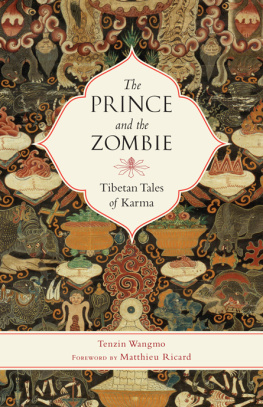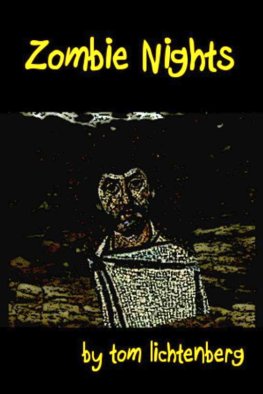ABOUT THE BOOK
In this series of tales, a prince must capture and bring back to his country a zombie who is endowed with magical powersbut in order to succeed he must keep himself from speaking even one word to the zombie. The zombie is wily, and during the long journey he recounts fascinating tales to the prince, who is carrying him in a sack on his back. Spellbound by the stories, the prince is drawn into making some comment on them. But the very moment he opens his mouth, the zombie escapes, and the prince has to go back to India to catch the zombie all over again. This same scenario occurs over and over, tale after tale, journey after journeyuntil the prince truly learns his lesson.
These zombie stories, known as the Vetalapancavimsati in Sanskrit, are engrossing teaching tales that originated in ancient India but have become popular in the Buddhist culture of Tibet, as well as in other Asian cultures. This Tibetan version of the stories conveys the values of Buddhism, particularly those related to karma (the laws of cause and effect), happiness, and suffering. Through these tales, the reader learns that Buddhism is a path of knowledge that leads to liberation from suffering.
TENZIN WANGMO was born in India in 1962 and was educated in Tibetan Buddhism. She grew up in Germany and has lived in Switzerland since 1974, first as a secondary school teacher and now as an advanced-level coach specializing in social integration, adult tutoring, and consultation to organizations in the process of undergoing major changes. She is also a lecturer and a Tibetan storyteller.
Sign up to receive weekly Tibetan Dharma teachings and special offers from Shambhala Publications.

Or visit us online to sign up at shambhala.com/edharmaquotes.
The Prince and the Zombie
TIBETAN TALES OF KARMA

Tenzin Wangmo
With a foreword by Matthieu Ricard
Translated by Sherab Chdzin Kohn

SHAMBHALA
Boston & London
2015
Shambhala Publications, Inc.
Horticultural Hall
300 Massachusetts Avenue
Boston, Massachusetts 02115
www.shambhala.com
Previously published as Les contes tibtains du Karma,
2012 by Infolio Editions
English translation 2015 by Shambhala Publications, Inc.
Cover art: Tibetan banner used courtesy of The Wellcome Library, London.
All rights reserved. No part of this book may be reproduced in any form or by any means, electronic or mechanical, including photocopying, recording, or by any information storage and retrieval system, without permission in writing from the publisher.
Library of Congress Cataloging-in-Publication Data
Tenzin Wangmo, 1962.
[Contes tibtains du Karma. English]
The prince and the zombie: Tibetan tales of karma / by Tenzin Wangmo;
with a foreword by Matthieu Ricard; translated by
Sherab Chdzin Kohn.First edition.
pages cm
eISBN 978-0-8348-0078-6
ISBN 978-1-61180-206-1 (paperback: alk. paper)
1. Buddhist literature, TibetanTranslations into English.
I. Vetalapacavimsati. II. Title.
PK3798.V2E5 2015
895.43dc23
2014029311
For my dear mother, Sonam Dolkar; for my dear father, Losang Namdol; and for my venerable teacher Lama Tnzang
You belong to the generation of Tibetans who have grown up in exile. You should take an interest in spirituality, culture, and also Tibetan history. You should seek the knowledge of your elders.
HIS HOLINESS THE FOURTEENTH DALAI LAMA
Lausanne, Switzerland
2009
Contents
From time immemorial and in all cultures, didactic tales have transmitted basic values. The story form is one that is inspiring for simple people and at the same time conveys profound ideas. Through the medium of a captivating narrative, such tales provide lessons that can help us to improve the way we lead our lives and to relate more harmoniously with others.
So it is with the zombie stories (Vetalapancavimsati in Sanskrit). While the tradition of these tales goes back to ancient India, they have become popular in the Buddhist culture of Tibet as well as in other Asian cultures.
Many variants exist. Usually they are twenty-five in number. The basic story is that the hero has to bring back to his country a zombie endowed with magical powers, and to succeed in doing this he must keep himself from speaking to the zombie so much as a single word. But the zombie is very cunning. During the long journey it recounts fascinating tales to the hero, who is carrying it on his back. Spellbound by the stories, the hero is drawn into making some comment on them. Alas, the very moment he opens his mouth, the zombie escapes. The hero is obliged to go back to India to catch the zombie again. The hero continuously fails to learn the lesson of his failures, which occur again and again, tale after tale, journey after journey.
But as it should be, alls well that ends well.
There are several Sanskrit versions of the Vetalapancavimsati. One of them was compiled in written form in the eleventh century by Somadeva on the basis of older oral versions. Introduction of the tales into Tibet, also in the eleventh century, is attributed to the great Indian pandit Atisha. The tales went on to be translated into Mongol, Kalmuk, and other Asiatic languages. In the twentieth century, various versions of them, either written or derived from oral tradition, were translated into Western languages.
The Tibetan versions convey the values of Buddhism, particularly those related to karmathe laws of cause and effect linked with the mechanisms of happiness and suffering. Buddhism can be looked at as a path of knowledge that leads to liberation from suffering. The enlightenment in which this path culminates is at once a state of wisdom based on an accurate understanding of reality and an emancipation from the disruptive emotions and veils arising from ignorance.
Buddhism emphasizes that human life is extremely precious, that the disenchantment that sometimes comes upon us does not signify that life is not worth living, but rather that we have not yet identified what it is that could give life meaning. The question is not knowing whether or not life has meaning but how each one of us can give it one, says the Dalai Lama. Extremely precious though it already is, our life would be even more precious if we could actualize the potential for transformation that exists within us.
As with attaining any goal, you cant go about putting an end to suffering and arriving at enlightenment just any old way. If we throw a stone up into the air, we should not be surprised if it falls on our head. In the same way, when we commit any act, whatever it may be, we can only expect that sooner or later it will produce an effect. Thus it is logical that if we want to free ourselves from suffering, we have to perform certain actions and refrain from certain others. The law of the causality of actions is the very foundation of the teaching of the Buddha, who proclaimed:
Avoid the least harmful act,
Perfectly accomplish the good,
And master your mind.
That is the teaching of the Buddha.
Phenomena condition each other mutually in a vast and creative process in which, however, nothing occurs arbitrarily and the law of causality operates ineluctably. Karma, which describes at one and the same time actions and their effects, is a particular aspect of this law of causality. It is karma that determines our lot, whether it be happiness or suffering. In other words, we are subject to the consequences of our past behavior and at the same time we are the architects of our future lives.
Next page















